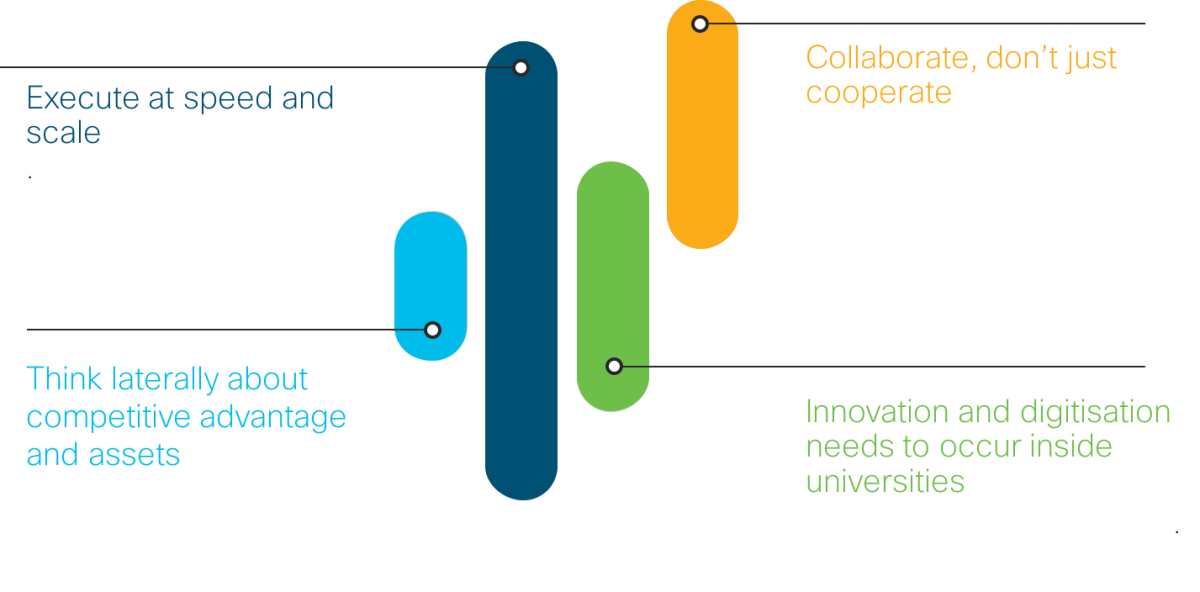Cisco explores industry-university collaboration models
The New Zealand and Australian economies are being disrupted in fundamental ways, driven by the rapid digitisation of industries and communities.

OLYMPUS DIGITAL CAMERA
Countries, institutions and individuals are starting to realise that an incremental response to change won’t be sufficient.
The inaugural 2017 Cisco New Zealand Higher Education and Government Study Tour was designed to help universities identify opportunities arising from disruption rather than focusing only on the challenges and risks.
The tour was supported by Intel and included visits to four of Cisco Australian partner universities – University of New South Wales, Flinders University, Curtin University and Edith Cowan University.
Australia’s first Chair in Digital Health Systems opened last year at Flinders at Tonsley. It is supported by Cisco Systems and the South Australian Government Premier’s Research and Industry Fund.
The centre is positioning Flinders as a national and international leader in digital health systems and technologies research. It will also foster digital health university-industry alliance relationships, putting South Australia at the forefront of new commercial opportunities.
Two topics dominated the agenda for the Cisco study tour: innovation models and the impact of digitisation.
The focus of institutions on the tour was not whether they should innovate or digitise, but rather how to do it and with whom.
Four conclusions were made about what universities needed to do to capture opportunities.

Execute at speed and scale
The scale of activity at the Tonsley Innovation Precinct at Clovelly park in Adelaide provided a stark example. When the automotive industry vacated a large parcel of land in Adelaide, the State Government decided to create a joint industry-university-polytechnic innovation precinct. The result: the innovation precinct employs more people today than when the last car rolled off the assembly line.
Think laterally about competitive advantage and assets
For many universities, competitive advantage will just as likely come from how they do things, not just what they do.
Collaborate, don’t just cooperate
Australia and NZ are small economies in a global context and the need to collaborate is more acute than elsewhere. Ideally, that collaboration occurs between university, industry and government to create a ‘triple helix’ effect a model that is proven in some of the world’s innovation hotspots including Barcelona, Israel, Singapore and the Scandanavian region.
The study tour visited two Cisco innovation centres in Australia and there is interest in how this can be adapted to the NZ context. The centres have a strong vertical focus, target SMEs and multinationals, focus on projects with a three to six-month execution window and are based on open innovation principles. Cisco’s model was considered by NZ universities to be an excellent template for an industry-driven research collaboration, in part because it is focused on delivering ‘wins’ for all parties.
Innovation and digitisation needs to occur inside universities
Universities can no longer afford to simply talk about innovation and digitisation. All Australian universities visited as part of the tour spoke of the importance of investing in their own technology to achieve innovation and broader objectives. Australian universities were considered more mature in terms of their own digitisation, with most Australian universities investing in digital campus/Internet of Things projects to improve student outcomes, research outcomes and operational efficiencies.
One of the most encouraging aspects of the study tour was the level and quality of collaboration that has occurred since. A range of potential projects have been tabled and are currently being worked through in the spirit of triple helix collaboration and we’ll continue to partner closely with universities and government organisations in NZ to further economic and community benefit.





